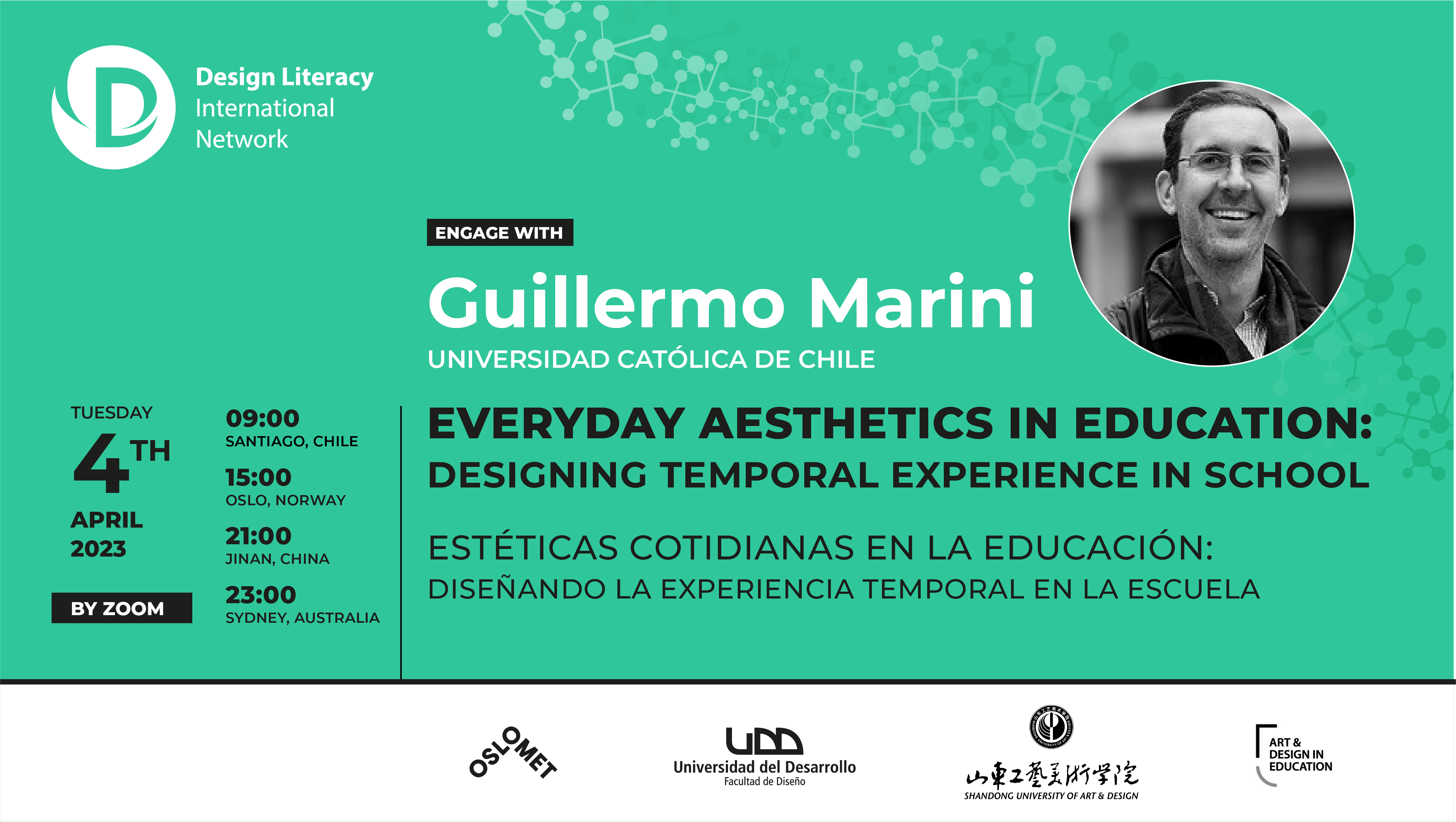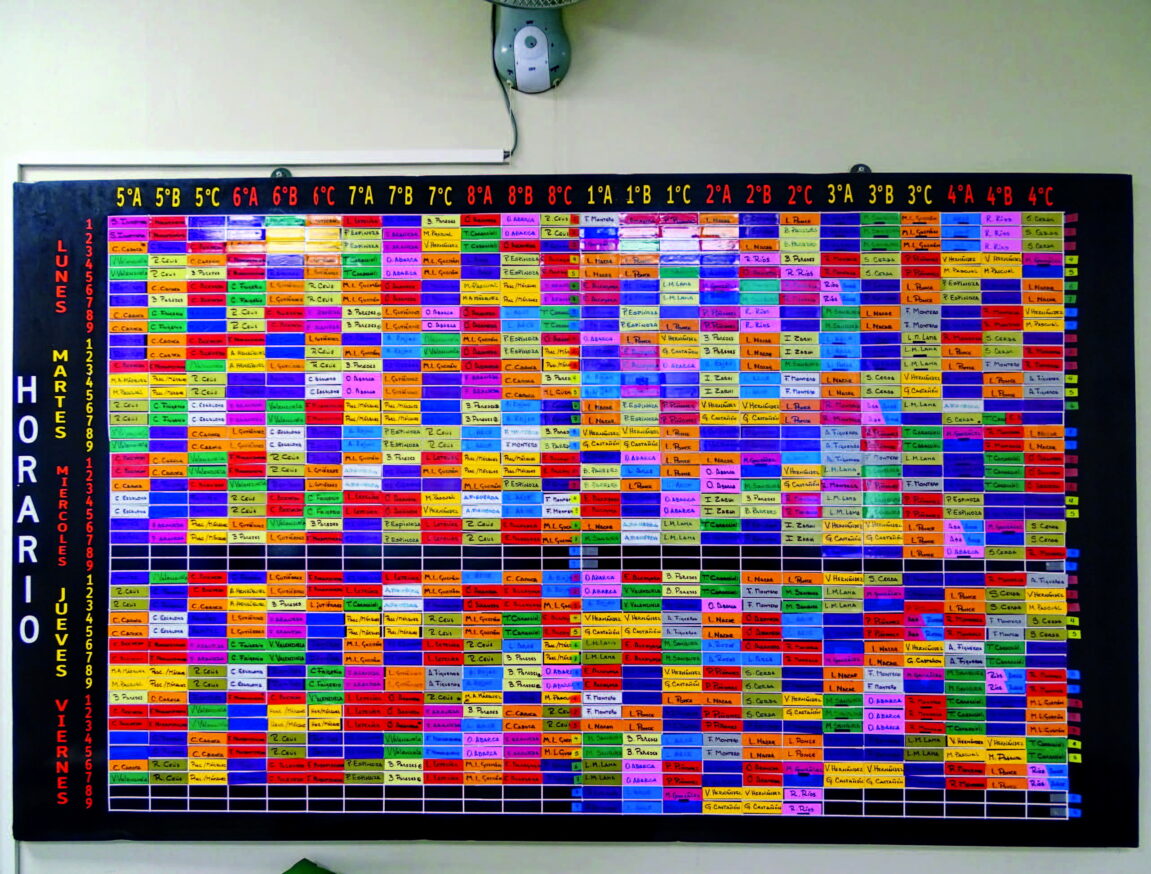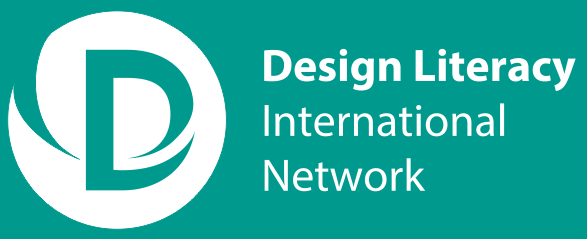
Guillermo Marini will deliver April’s Engage with Ideas talk tiled Everyday Aesthetics in Education: Designing Temporal Experience in School. Guillermo will discuss time as a key dimension of pedagogical experience. His talk is based on a research which explored how time is manifested in Chilean primary schools. A photo of a poster from one of the schools which participated in the research provides an example of how time can be visually represented, in this instance, by its ‘Cartesian’ grid structure, but also how colour was used to code the subjects and year levels.

A poster showing a schedule for classes for one of the municipal school’s terms.
(Marini & Rodríguez Merchán, 2020, pp. 532–533)
The research results have been disseminated in the journal of Visual Communication (Marini & Rodríguez Merchán, 2020) and the Journal of Philosophy of Education (Marini & Rodríguez Merchán, 2021).
He will argue that the habitual design of classroom schedules seems to imply that what students share with their classmates is fundamentally age; that all students need to learn and approve the same contents exactly at the same rhythm; and that there is a pervasive efficiency-oriented way of dealing with time that renders relaxation, slowness, delay and interruption as anti-educational traits.
In relation to such experience of time, Guillermo will propose that everyday classroom movements tend to remain indifferent to student’s identities and sensibilities, which, he argues, is due to the anonymous use of classroom space, and the uncritical repetition of physical routines that presume learning has to do with static and indoor exchanges, rather than playful and outdoor activities.
He will discuss how Sakuteiki, the ancient Japanese gardening manual has inspired him to tackle the above conceptual and practical shortcomings. In the manual, Tachibana no Toshuitsuna proposes a series of orientations that affect, and sometimes dictates, the temporal unfolding of experience by means of a peculiar design of walkways and bridges.
One orientation is Suji Kaete (changing the axis) ‘One frequently employed strategy for making the walking experience enriching and stimulating is to make the path marked by stepping stones and pavements meandering rather than straight. The effect of such an arrangement is that the walker is encouraged to pause and slightly alter the direction in the middle of the otherwise straight path or bridge, which provides a different view of the garden’ (Saito 2017, p. 155).
Another orientation Miegakure (now you see it, now you do not), achieved by intentionally blocking or partially obscuring a scenic view, giving us only hints and glimpses, what excites us and invites us to proceed (Saito, 2017, p. 160).
Both Suji Kaete and Miegakure help to reconcile subjective paces with the development of everyday school experience, body movement with learning, interruption with education, and surprise with the joy of going back to school.
Event recording
Guillermo Marini is Associate Professor at the School of Education, Pontificia Universidad Católica de Chile. He holds an EdM in Arts in Education from Harvard University, and a PhD in Philosophy and Education from Columbia University. His research and teaching focuses on everyday aesthetics in education, arts-based methodologies, and the dialogue between those who build and inhabit the school. He has published in Journal of Philosophy of Education, Studies in Philosophy and Education, Journal of Aesthetic Education, ARQ, Visual Communication, Visual Ethnography, International Journal of Education through Art, International Studies in Catholic Education, Trans/Form/Açao and Educaçao e Sociedade.
https://uc-cl.academia.edu/GuillermoMarini
References
Marini, G., & Rodríguez Merchán, J. D. (2020). Images of School Times: Organizing Rhythms, Revealing Pedagogies. Visual Communication, 19(4), 531–540. https://doi.org/10.1177/1470357219891747
Marini, G. & Rodríguez Merchán, J. D. (2021) Reconsidering time in schools: an everyday aesthetics perspective. Journal of Philosophy of Education, 55: 893–904. https://doi.org/10.1111/1467-9752.12592
Saito, Y. (2017) Aesthetics of the familiar: everyday life and world-making. Oxford: Oxford University Press.
Bookings
Bookings are closed for this event.
